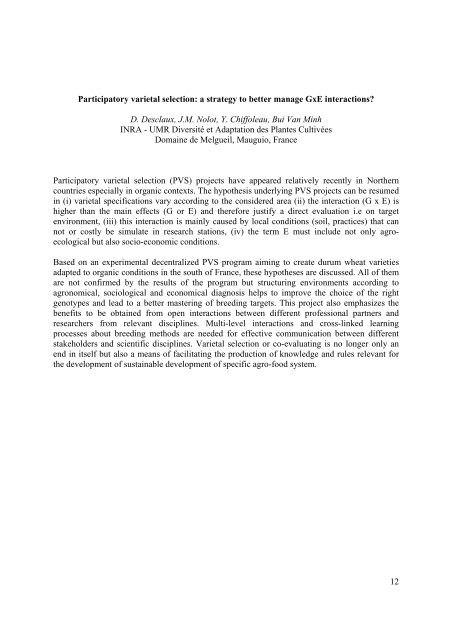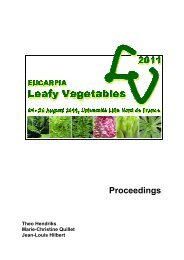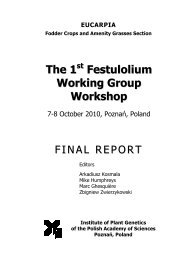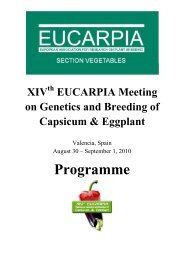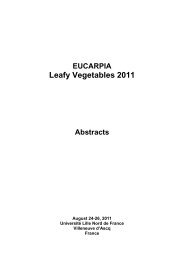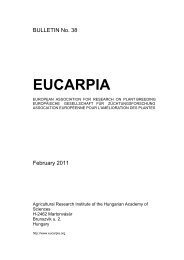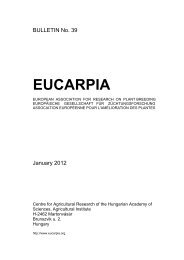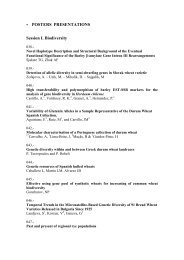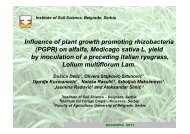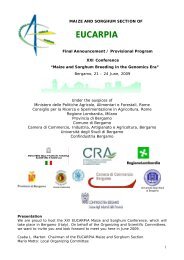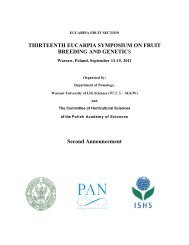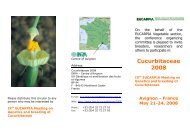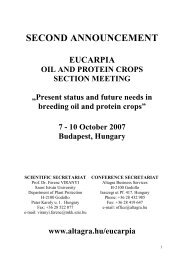Plant breeding for organic and sustainable, low-input agriculture
Plant breeding for organic and sustainable, low-input agriculture
Plant breeding for organic and sustainable, low-input agriculture
You also want an ePaper? Increase the reach of your titles
YUMPU automatically turns print PDFs into web optimized ePapers that Google loves.
Participatory varietal selection: a strategy to better manage GxE interactions?<br />
D. Desclaux, J.M. Nolot, Y. Chiffoleau, Bui Van Minh<br />
INRA - UMR Diversité et Adaptation des <strong>Plant</strong>es Cultivées<br />
Domaine de Melgueil, Mauguio, France<br />
Participatory varietal selection (PVS) projects have appeared relatively recently in Northern<br />
countries especially in <strong>organic</strong> contexts. The hypothesis underlying PVS projects can be resumed<br />
in (i) varietal specifications vary according to the considered area (ii) the interaction (G x E) is<br />
higher than the main effects (G or E) <strong>and</strong> there<strong>for</strong>e justify a direct evaluation i.e on target<br />
environment, (iii) this interaction is mainly caused by local conditions (soil, practices) that can<br />
not or costly be simulate in research stations, (iv) the term E must include not only agroecological<br />
but also socio-economic conditions.<br />
Based on an experimental decentralized PVS program aiming to create durum wheat varieties<br />
adapted to <strong>organic</strong> conditions in the south of France, these hypotheses are discussed. All of them<br />
are not confirmed by the results of the program but structuring environments according to<br />
agronomical, sociological <strong>and</strong> economical diagnosis helps to improve the choice of the right<br />
genotypes <strong>and</strong> lead to a better mastering of <strong>breeding</strong> targets. This project also emphasizes the<br />
benefits to be obtained from open interactions between different professional partners <strong>and</strong><br />
researchers from relevant disciplines. Multi-level interactions <strong>and</strong> cross-linked learning<br />
processes about <strong>breeding</strong> methods are needed <strong>for</strong> effective communication between different<br />
stakeholders <strong>and</strong> scientific disciplines. Varietal selection or co-evaluating is no longer only an<br />
end in itself but also a means of facilitating the production of knowledge <strong>and</strong> rules relevant <strong>for</strong><br />
the development of <strong>sustainable</strong> development of specific agro-food system.<br />
12


